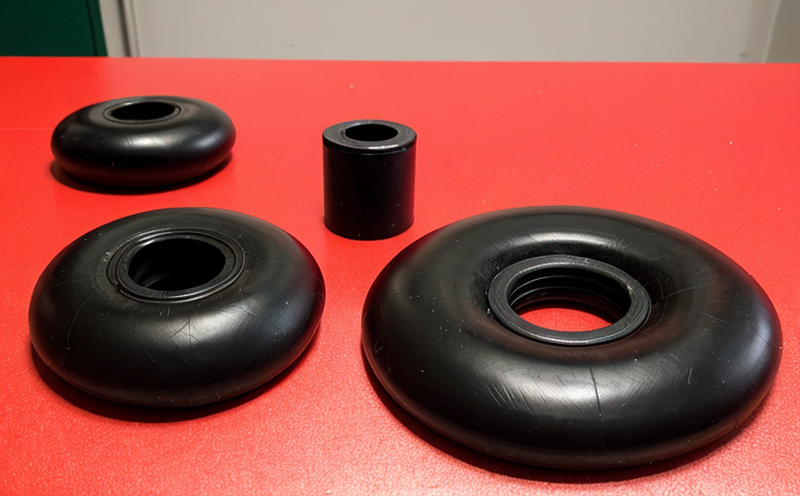DIN 53505 IRHD Hardness Testing of Rubber
The IRHD hardness test, as per the standard DIN 53505, is a critical procedure for evaluating the mechanical properties of rubber and elastomers. This test provides a numerical value that quantifies how hard or soft a sample is under specific conditions. The IRHD scale ranges from 1 to 120, with higher values indicating greater hardness.
This method is widely used across various industries including automotive, footwear, medical devices, and construction materials where the physical properties of rubber products are crucial for performance and safety. For instance, in the automotive industry, the hardness affects the durability and lifespan of tires; similarly, in the medical sector, it influences the comfort and effectiveness of elastomeric components used in prosthetics.
The testing procedure involves applying a defined force to a steel ball indenter using a calibrated instrument. The depth of indentation is measured after a specified time interval. The hardness value is then derived based on this measurement. Precise specimen preparation ensures accurate results, and Eurolab’s experienced technicians ensure that every step adheres strictly to the standard.
The significance of DIN 53505 IRHD testing lies in its ability to provide consistent, reproducible data which are essential for quality control and compliance with international regulations. It allows manufacturers to optimize their product design by understanding how changes in formulation or processing affect the hardness of rubber components. This is particularly important when developing new materials that need to meet specific performance criteria.
For those involved in research and development, DIN 53505 IRHD testing offers valuable insights into material behavior under different conditions. By comparing test results with theoretical predictions or historical data, researchers can refine their models and improve product performance. Compliance officers benefit from this standardized method as it ensures that products meet the required specifications set by industry standards.
Moreover, the accuracy of IRHD hardness testing is enhanced by modern digital instruments which offer higher precision compared to manual methods. These tools not only reduce human error but also allow for faster turnaround times, making them indispensable in today's fast-paced manufacturing environments.
Why It Matters
- Ensures consistency across batches of rubber products,
- Aids in quality control and assurance,
- Helps manufacturers optimize their processes by providing valuable feedback on material properties,
- Supports compliance with international standards and regulations.
The importance of DIN 53505 IRHD hardness testing cannot be overstated. It plays a pivotal role in ensuring that rubber products meet the desired specifications, thereby enhancing their performance and reliability. By accurately measuring hardness, this test helps prevent defects and improves overall product quality.
Eurolab Advantages
- State-of-the-art equipment that meets the highest industry standards,
- A team of highly qualified and experienced technicians,
- Comprehensive support services including consultation on test methods and interpretation of results,
- Accurate and reliable testing results that are essential for regulatory compliance.
At Eurolab, we pride ourselves on delivering exceptional service. Our advanced facilities and skilled personnel ensure that all tests conducted meet the highest standards. Whether you're a quality manager overseeing production processes or an R&D engineer looking to enhance material performance, our expertise will prove invaluable.
Why Choose This Test
- Accurate and precise results,
- Comprehensive support services,
- Highly experienced technical staff,
- State-of-the-art equipment.
Selecting DIN 53505 IRHD hardness testing for your rubber products offers numerous advantages. The precision and reliability of these tests are second to none, ensuring that you receive accurate data every time. Our team is committed to providing exceptional service, offering support not just during the testing phase but also throughout the entire project lifecycle.





